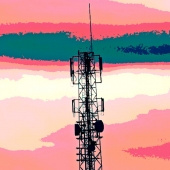-
Stealthy GTPDOOR Linux malware targets mobile operator networks
Security researcher HaxRob discovered a previously unknown Linux backdoor named GTPDOOR, designed for covert operations within mobile carrier networks.
- March 03, 2024
- 10:16 AM
 2
2
-
FCC orders telecom carriers to report PII data breaches within 30 days
Starting March 13th, telecommunications companies must report data breaches impacting customers' personally identifiable information within 30 days, as required by FCC's updated data breach reporting requirements.
- February 12, 2024
- 04:50 PM
 0
0
-
Verizon insider data breach hits over 63,000 employees
Verizon Communications is warning that an insider data breach impacts almost half its workforce, exposing sensitive employee information.
- February 06, 2024
- 11:02 AM
 2
2
-
Pro-Ukraine hackers breach Russian ISP in revenge for KyivStar attack
A pro-Ukraine hacktivist group named 'Blackjack' has claimed a cyberattack against Russian provider of internet services M9com as a direct response to the attack against Kyivstar mobile operator.
- January 10, 2024
- 02:43 PM
 0
0
-
Ukraine's largest mobile carrier Kyivstar down following cyberattack
Kyivstar, Ukraine's largest telecommunications service provider serving over 25 million mobile and home internet subscribers, has suffered a cyberattack impacting mobile and data services.
- December 12, 2023
- 10:46 AM
 0
0
-
New 5Ghoul attack impacts 5G phones with Qualcomm, MediaTek chips
A new set of vulnerabilities in 5G modems by Qualcomm and MediaTek, collectively called "5Ghoul," impact 710 5G smartphone models from Google partners (Android) and Apple, routers, and USB modems.
- December 08, 2023
- 10:23 AM
 0
0
-
Meta rolls out default end-to-end encryption on Messenger, Facebook
Meta has announced that the immediate availability of end-to-end encryption for all chats and calls made through the Messenger app, as well as the Facebook social media platform.
- December 07, 2023
- 09:27 AM
 2
2
-
Krasue RAT malware hides on Linux servers using embedded rootkits
Security researchers discovered a remote access trojan they named Krasue that is targeting Linux systems of telecommunications companies and managed to remain undetected since 2021.
- December 07, 2023
- 01:00 AM
 0
0
-
Russian Sandworm hackers breached 11 Ukrainian telcos since May
The state-sponsored Russian hacking group tracked as 'Sandworm' has compromised eleven telecommunication service providers in Ukraine between May and September 2023.
- October 16, 2023
- 02:06 PM
 0
0
-
Lyca Mobile investigates customer data leak after cyberattack
Lyca Mobile has released a statement about an unexpected disruption on its network caused by a cyberattack that may have also compromised customer data.
- October 05, 2023
- 11:01 AM
 0
0
-
Budworm hackers target telcos and govt orgs with custom malware
A Chinese cyber-espionage hacking group tracked as Budworm has been observed targeting a telecommunication firm in the Middle East and a government entity in Asia using a new variant of its custom 'SysUpdate' backdoor.
- September 28, 2023
- 09:52 AM
 0
0
-
‘Sandman’ hackers backdoor telcos with new LuaDream malware
A previously unknown threat actor dubbed 'Sandman' targets telecommunication service providers in the Middle East, Western Europe, and South Asia, using a modular info-stealing malware named 'LuaDream.'
- September 21, 2023
- 03:50 PM
 0
0
-
Hackers backdoor telecom providers with new HTTPSnoop malware
New malware named HTTPSnoop and PipeSnoop are used in cyberattacks on telecommunication service providers in the Middle East, allowing threat actors to remotely execute commands on infected devices.
- September 19, 2023
- 11:14 AM
 0
0
-
Rogers internet outage affecting customers in Ontario, Canada
Rogers customers, primarily those located in Downtown Toronto and parts of Ontario, are reporting outages this week affecting their internet service. Some report being without internet for days, while others are experiencing intermittent disruptions and slowdowns when using their internet.
- September 07, 2023
- 08:27 AM
 2
2
-
EncroChat takedown led to 6,500 arrests and $979 million seized
Europol announced today that the takedown of the EncroChat encrypted mobile communications platform has led to the arrest of over 6,600 people and the seizure of $979 million in illicit funds.
- June 27, 2023
- 10:20 AM
 0
0
-
SMS delivery reports can be used to infer recipient's location
A team of university researchers has devised a new side-channel attack named 'Freaky Leaky SMS,' which relies on the timing of SMS delivery reports to deduce a recipient's location.
- June 17, 2023
- 10:07 AM
 0
0
-
TELUS investigating leak of stolen source code, employee data
Canada's second-largest telecom, TELUS is investigating a potential data breach after a threat actor shared samples online of what appears to be employee data. The threat actor subsequently shared screenshots apparently showing private source code repositories and payroll records held by the company.
- February 23, 2023
- 09:54 PM
 2
2
-
FCC wants telecom carriers to report data breaches faster
The U.S. Federal Communications Commission wants to strengthen federal law enforcement and modernize breach notification requirements for telecommunications companies so that they notify customers of security breaches faster.
- January 06, 2023
- 01:11 PM
 0
0
-
Sneaky hackers reverse defense mitigations when detected
A financially motivated threat actor is hacking telecommunication service providers and business process outsourcing firms, actively reversing defensive mitigations applied when the breach is detected.
- December 05, 2022
- 03:08 PM
 0
0
-
Iranian hackers target energy sector with new DNS backdoor
The Iranian Lycaeum APT hacking group uses a new .NET-based DNS backdoor to conduct attacks on companies in the energy and telecommunication sectors.
- June 10, 2022
- 02:06 PM
 0
0
- 1
- 2


























